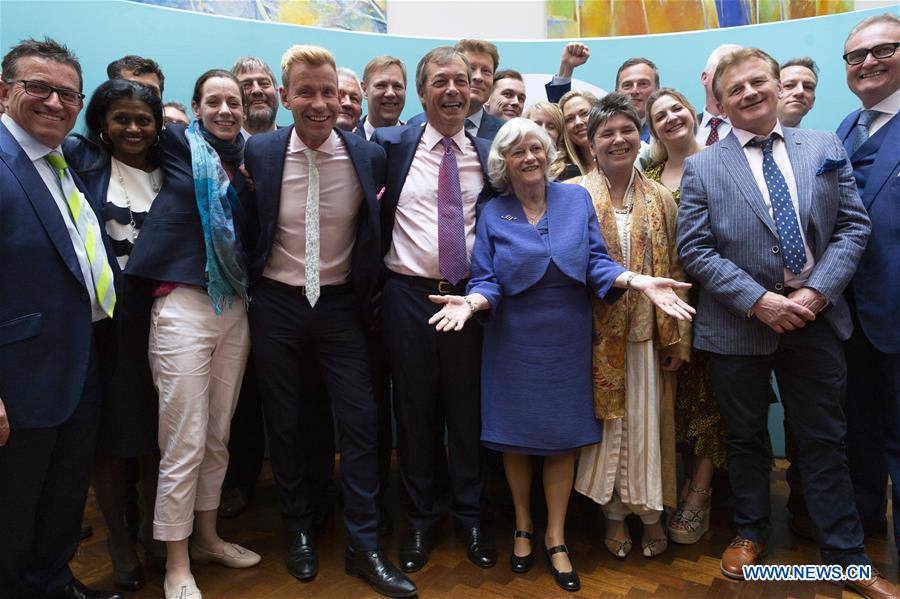
Brexit Party leader Nigel Farage (C) poses at a Brexit Party event in London, Britain, on May 27, 2019. It was the failure by both the Conservatives and Labour to resolve how to implement the result of the 2016 referendum on European Union (EU) membership that allowed Nigel Farage's rookie Brexit Party to make a stunning election debut. Winning at least 28 of Britain's 73 seats in the European Parliament just six weeks after being formed is without parallel in British politics. (Xinhua/Ray Tang)
LONDON, May 27 (Xinhua) -- While Britain's big political giants, the Conservatives and Labour, lick their wounds over disastrous results in the European elections, it has left the question of Brexit unanswered, with no magical formula emerging to break the deadlock.
Battered and bruised, the Conservatives, as the governing party, have the task of juggling with an election campaign to find a successor for Prime Minister Theresa May, and finding a way through the political logjam caused by its failure to win backing for a withdrawal deal.
It was the failure by both the Conservatives and Labour to resolve how to implement the result of the 2016 referendum on European Union (EU) membership that allowed Nigel Farage's rookie Brexit Party to make a stunning election debut.
Winning at least 28 of Britain's 73 seats in the European Parliament just six weeks after being formed is without parallel in British politics.
Millions of people turned to the Brexit Party because it had one clear message: the need to implement the result of the 2016 referendum.
The results show supporters of both the Conservative and Labour parties wanted to demonstrate their feelings on how Brexit was still unresolved three years after the biggest referendum in British political history.
The Conservatives, the dominant force in British politics across three centuries, ended up in fifth place in the European elections, gathering a pitiful 8 percent of the votes in England and Wales.
As a party at war with itself, the Conservatives have shown the door to Theresa May, and many of its supporters have shown the door to the Conservative Party. Its future is at risk as it contemplates political suicide.
The election result adds a new impetus to the race to choose a successor to Theresa May. Will it be a consensus politician demanding a new deal or a no-deal departure if that demand is not forthcoming? Or will it be a leader who keeps Britain as a member of the EU?
The new leader of the Conservative Party, who will take over at 10 Downing Street, like May, will have to grapple with a squabbling group of MPs who have different views on how to steer a Brexit course. Will they accept a no-deal Brexit if push comes to shove, or a second confirmatory referendum on a deal that somehow manages to get through the Westminster maze? Will there be a risky snap general election?
Currently a political fog makes it difficult to see any way forward whoever takes over from May.
Labour, the main opposition party, is also struggling to reconcile a membership divided between those who want to leave the EU at any cost, and those who want to remain to protect the way Brussels has brought in rights that protect working rights, dear to the hearts of traditionally voting Labour supporters.
Labour's John McDonnell and party leader Jeremy Corbyn are warming to the prospect of a second referendum.
Professor Iain Begg, a political expert from the London School of Economics, told Xinhua Monday that his magic formula would be for Britain to install a cross-party national government with a primary goal of resolving Brexit.
"Like everything else, the stumbling-block is arriving at a parliamentary majority, but there comes a point when, referencing Conan Doyle, you have eliminated the impossible, whatever remains, however improbable, must be the truth," he said.
Begg, who is a research fellow at the LSE's European Institute, added that it seems to have been taken as read that the Conservative membership in picking a leader to succeed May is also picking the next Prime Minister.
"But what happens if that person is unable to command a majority in the Commons, either because the Democratic Unionist Party (DUP) pulls out of the confidence and supply arrangement it brokered with Theresa May, or a handful of Conservative MPs decide to oppose the new leader? Neither is that implausible," added Begg.
Professor Patrick Minford from Cardiff Business School thinks the winning formula could be in the hands of the successor to May at Number 10.
Minford told Xinhua on Monday: "The new Conservative leader needs to renegotiate the withdrawal agreement with Brussels, it is as simple as that. With a new EU it is possible."
Professor John Curtice, an elections expert from Strathclyde University, has described Britain as a divided and polarised nation.
"The two most popular choices are leaving the EU without a deal and having a second referendum. Resolving the Brexit impasse is not going to be easy because we are divided and polarised," Curtice said.
The future, added Curtice, points to a period of more fractious politics.
The Brexit clock is ticking away, with the EU-agreed deadline of Oct. 31 to find a deal emerging on the horizon.
When the dust settles on the EU election result and the party leadership, Brexit will be waiting in the wings to be resolved.











